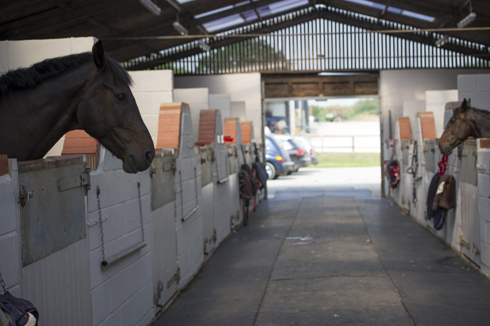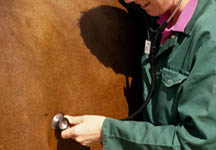Owners have been served a “timely” reminder to ensure they recognise the signs of notifiable diseases after a case of equine infectious anaemia (EIA) was reported in France.
This was the first recorded case in France this year and the risk to the UK horse population has not increased, according to experts at Defra and the Animal and Plant Health Agency (APHA), which “continues to monitor the situation”.
On 18 May, a 19-year-old mare was reported to have EIA following a positive result for the Coggin’s test, which checks for EIA antibodies in a horse’s blood.
The premises, in the Gard region of the south of France, had 11 animals on site.
The mare was put down and disease control measures have been put in place. An investigation into the outbreak is also ongoing.
“We currently consider there is a medium risk that we may detect a case of EIA in the UK in any one year,” states the joint report from Defra, APHA and international disease monitoring advice service. This risk is not changed by this latest case in France.
“This risk estimate reflects the lack of routine surveillance and the non-specific nature of clinical signs for EIA, particularly with respect to the non-competition and non-thoroughbred horse population.
“For our high-value competition horses there is generally a higher level of awareness of the clinical signs and requirement to report disease among keepers.
“This is a timely event to remind keepers of horses and other equidae that the infection can remain sub-clinical for several years, and recent imports are not necessarily the only animals which could test positive for EIA.
“It is therefore important to be aware of all the clinical signs of EIA and other notifiable diseases of horses and to promptly report suspicions of disease to a veterinary surgeon.”
The disease is reported periodically in western Europe — single outbreaks have been reported in Greece, Hungary and Bulgaria this year, while Romania and Italy are considered endemic for EIA.
Last year, five cases were reported in France, with cases also reported in Greece, Austria, Hungary and Bulgaria.
The last outbreak in the UK was in 2012, when horses known to have come from Romania several years previously tested positive. There was no spread from these horses while they were in the UK.
Article continues below…
You might also be interested in:

Subscribe to Horse & Hound magazine today – and enjoy unlimited website access all year round

Calls for better basic biosecurity to prevent spread of disease *H&H Plus*

Biosecurity: how to protect your horse from diseases
What is EIA?
EIA can remain “clinically silent” in infected horses for several years.
It affects horses’ immune systems and can cause death. There is no cure, so infected horses must be euthanised.
The disease is slow to spread and is transmitted through blood, for example by biting flies or using surgical equipment that has not been properly disinfected.
Signs of the acute form vary considerably, but include fever, depression, increased heart and respiratory rate, bloody diarrhoea, loss of co-ordination, poor performance, ataxia, rapid weight loss, skin swelling and jaundice. A chronically infected horse may have recurring bouts of fever, depression, anaemia, weakness or weight loss, interspersed with periods of normality.
Any horse showing severe, unexplained anaemia should be isolated and tested for EIA as soon as possible.
We continue to publish Horse & Hound magazine weekly during the coronavirus pandemic, as well as keeping horseandhound.co.uk up to date with all the breaking news, features and more. Click here for info about magazine subscriptions (six issues for £6) and access to our premium H&H Plus content online.





